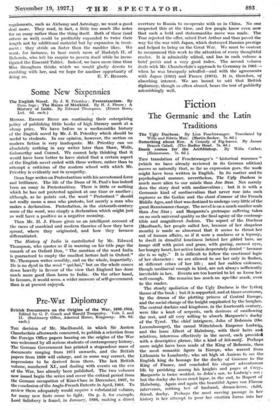Some New Sixpennies
The English Novel. By J. B. Priestley ; Protestantism. By Dean Inge ; The Races of Mankind. By H. J. Fleure ; A History of India. By Edward Thompson. (Ernest Benn, Ltd. 6d. each.) MESSRS. EnNEST BENN are continuing their enterprising policy of publishing little book of high literary merit at a
cheap price. We have before us a workmanlike history of the English novel by Mr. J. B. Priestley which should be useful to students. In our opinion, however, the section on modern fiction is very inadequate. Mr. Priestley can see absolutely nothing in any writer later than Shaw, Wells, Galsworthy and Conrad. We e.ammt help thinking that it would have been better to haVe stated that a certain aspect of the English novel ended with these writers, rather than to attempt a criticism of the modern school with which Mr. Priestley is evidently not in sympathy.
Dean Inge writes on Protestantism with his accustomed force and brilliance. The life of the Dean of St. Paul's has indeed been an essay in Protestantism. There is little or nothing which he has not protested against at one time or another ; although, as he point's out, the word " Protestant " should not really mean a man who protests, but merely a man who makes a declaration. Protestation, in the sixteenth-century sense of the word, was simply a declaration which might just as well have a positive as a negative meaning.
Then Mr. H. J. Fleure givel us an intelligent account of the races of mankind and modern theories of how they have spread, where they originated, . and how - they became differentiated.
The History of India is contributed by Mr. Edward Thompson, who quotes as if in warning on his title page the
remark of an Oxford Don, " The mention of the word India is guaranteed to empty the smallest lecture hall in Oxford.' Mr. Thompson writes sensibly, and on the whole, impartially.
He is no dyed in the wool " qui-hai," but on the whole comes down heavily in favour of the view that England has done much more good than harm to India. On the other hand, he favours, it would seem, a wider measure of self-government than is at present enjoyed.














































 Previous page
Previous page